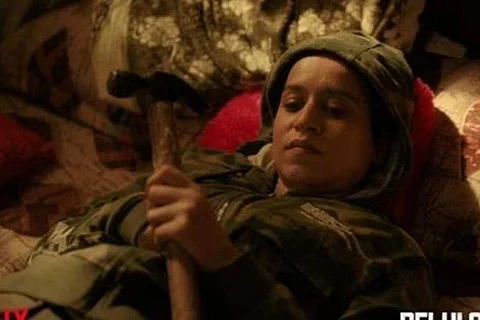

Until recently, the second season of Delhi Crime was on Netflix’s Top 10 watch list, thanks to, among other things, Tillotama Shome’s chilling portrayal of a serial killer that continues to haunt long after the show is over. Her Lata Solanki is an ambitious beautician, who is trying to make money in order to rise up the impossible class ladder. When everything else fails, she resorts to brutal murders to get the bucks.
The choice to play a negative character is a departure from Shome’s filmography, which has roles that predominantly fall on the ‘right’ side of the moral spectrum. The actor made a confident debut as Alice in Monsoon Wedding, a light-hearted yet nuanced take on the intricacies of an Indian wedding, and progressed with Sir, which looks at romance through the lens of class-based politics, and Chintu Ka Birthday examines the power of love and compassion in the times of war.
Shome’s constant strength through all these characters has been her ability to portray vulnerability. Lata was no exception. She brings a strange tenderness to the character, making the eventual revelation of her as the serial killer shocking. “I look for parts that strongly connect with me,” the actor says, adding that the roots of this career-defining performance lie deep and scattered across different aspects of life.
“One doesn’t have to be a criminal psychologist to understand that the country and the state punish criminals often for their own neglect. It is the failure of the country in performing its citizen duties that lead to crimes because someone doesn’t have food, access to healthcare, and basic rights. It is not just moral perversion or a disease that pushes them to commit a crime; it is often situational. And yet, we don’t suspend our moral judgement and believe we are superior to the criminal,” she says, bringing a philosophical and political perspective, while elaborating on how she perceives dark characters.
Shome is no stranger to essaying characters whose lives are jeopardised or affected by the world around them. In the wonderfully humane Qissa (2013), set right after Partition, she plays Kanwar Singh, a girl raised as a boy, who discovers her inner femininity. In the 2014 film, Children of War, blood-soaked documentation of war crimes that transpired during the 1971 Bangladesh Liberation War, she plays Bhitika, a woman imprisoned in a ramp camp, who gathers strength to seek freedom.
The harshness of reality has been constant throughout her art, and her experience of conducting drama therapy in a prison on Rikers Island, US, she says, led to many discoveries. “I learned a lot about myself while working there, with one of the most important things being that the line between sanity and insanity is thin and porous, with a small something in your environment enough to trigger you to lunge from one side to the other. The line between guilty and innocent is even thinner,” the actor says, adding that she was intrigued about the criminals and the stories that landed them in prison.
“It is the classic crime and punishment question, but we must ask ourselves if the punishment is aimed at creating a fairer world,” she says, quickly adding, “A loving, supportive environment can bring you back from insanity to sanity. The idea of remorse and repentance emerges from being treated as a human being.”
Ani is insanely relatable: Mila Kunis on her 'Luckiest Girl Alive' character
Matthew Perry says it was scary when his ‘Friends’ co-star Aniston called him out for alcohol abuse
Actress Taapsee Pannu hosts a Diwali bash for industry friends
Luxury fashion house Balenciaga severs ties with Kanye West
Shivin Narang opens up on working with Amitabh Bachchan and Rashmika Mandana